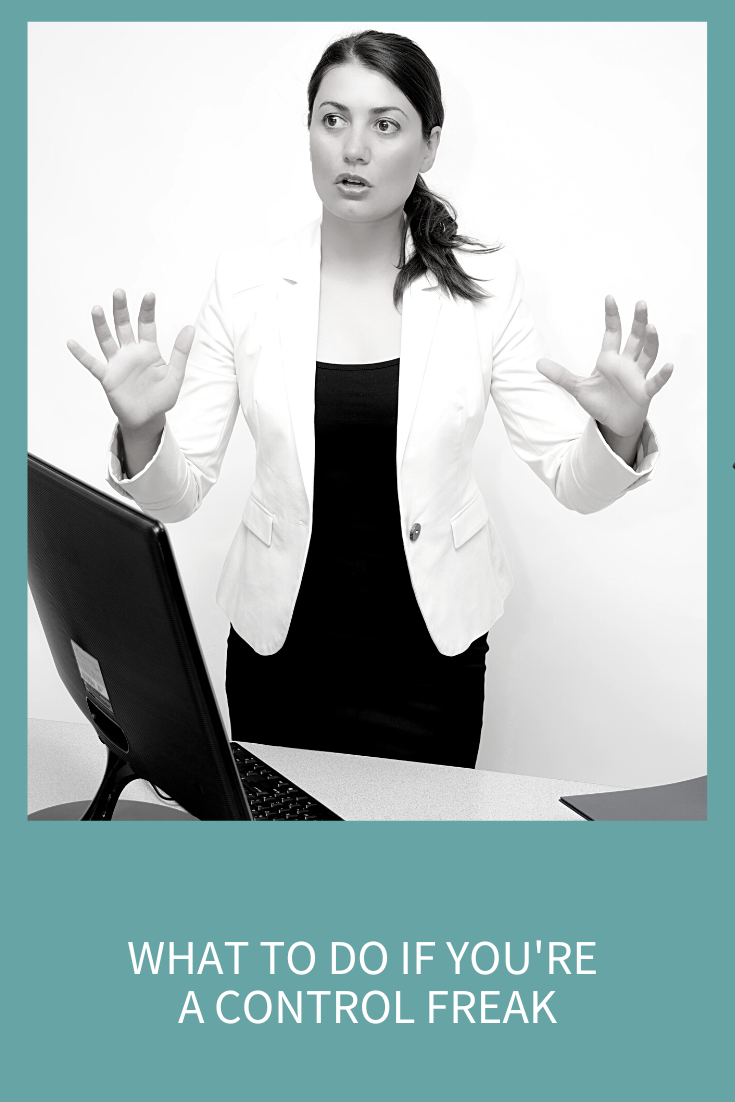
There’s a big difference between being controlling and being in control. Being in control is awesome. It means you’re self-aware, confident, and have strong self-esteem. But being controlling is the opposite. It’s an unhealthy sign that your self-esteem is rocky, and that fear is running the show. Today I’m going to teach you the three reasons you’ve got control issues and my top five tips for finding peace and security within yourself.
12-minute read
Let me say first that it’s absolutely normal and natural to want to be in control. Being in control gives us a sense of safety and security, which we’re hardwired to want. The issue is when this pendulum swings too far in either direction. When that control pendulum swings too far, we end up straining our relationships as people become annoyed and resistant to our bossy, judgmental, critical, rigid, and controlling behavior. The reality is that we really can’t control the majority of people and events in our lives. The more we try to control, the more arguments, anger, hurt feelings, conflict, resentment and emotional distance we create! When all those things come at us, we feel even more out of control which results in us trying to control even more, and those issues become even more pronounced! It’s a vicious cycle leaving us feeling isolated, frustrated, anxious, and full of fear-based emotions.
Signs You Might Have Control Issues
- You get jealous easily.
- You believe there’s a right way and a wrong way to do everything (otherwise known as your way or the wrong way).
- You’re a perfectionist.
- You get highly stressed when things don’t go your way.
- You’re critical of other people’s ideas or voice your opinions without being asked (yes, unsolicited advice, even if you know what’s best for others, is controlling).
- You often get involved in other people’s issues or business.
- You tend to be possessive in relationships.
- You threaten coworkers, your kids, or your partner to gain power and control.
- You think of yourself as highly persuasive.
- Others have said you dominate, take advantage, peer pressure or maybe you’ve even been called (gasp!), a bully.
- Others have said you’re overbearing or intimidating.
- Substance abuse, disordered eating, excessive exercising or cleaning/organizing.
You have a hard time respecting other people’s boundaries but likely don’t even realize it. You bulldoze your way in and think you’re being helpful or saving time, etc., but what you’re really doing is allowing your control issues to take center stage.
Have you checked out my YouTube Channel yet? Subscribe to my channel and get weekly tips on how to be in successful relationships with others and yourself!
Three Reasons You’re a Control Enthusiast
There are three main reasons you might have control issues today in your life.
Reason #1: Your Childhood
Most control issues you’re experiencing as an adult can be traced back to some issue with how you attuned or attached to your primary caregivers as a kid. It doesn’t mean there was serious trauma (although there might have been); it means that something was just off between the way you were parented and what your individual needs were. This could be anything from not feeling unconditional love and acceptance from your parents or primary caregivers to abuse or neglect. Depending on this misalignment, your control issues can take various forms.
For example, if you didn’t feel loved by your dad, you might have become a perfectionist who got straight A’s in order to receive attention from him. You might have sought out his praise and reassurance, which was the only real way to boost your self-esteem and feel good about yourself.
Or maybe you grew up with an alcoholic mother and grew to hate never being able to count on anything being consistent in your home growing up. As an adult, you crave order and only feel calm when things are happening in a certain way. When you’re in control, you know what to expect, so think this means no surprises can come your way, which makes you feel safe.
Maybe you had a caregiver or coach who was so controlling that you’re craving control in your current life. Maybe you were the victim of sexual, physical, or emotional abuse, and you don’t want to let anyone see cracks in your current armor for fear that they’ll take advantage.
Maybe you felt neglected in some way by one or both of your parents or guardians. In this case, you’ve had to control your environment from an early age just to survive and get by. You became used to relying only on yourself because you didn’t feel you could rely on those who were supposed to be in the driver’s seat. That pattern of thoughts and behaviors gets set, and it’s hard to break.
Reason #2: Trauma
The second reason you might be experiencing control issues now is likely related to some past or ongoing trauma. You might have had a great, securely attached relationship with your parents but were raped as a college freshman and now look for ways to stay in control so you can feel safe.
Or maybe you’re being controlled by someone else, so feel the need to exert control wherever you can when you’re out of that person’s sphere. Maybe this is a controlling boss, or maybe your spouse or partner is domineering or jealous. You might have a manipulative or overprotective parent who still runs parts of your life, so you look for ways to regain control in other areas.
Reason #3: A Mental Health Diagnosis
The third reason you might be struggling with your inner control freak is that it’s related to a mental health diagnosis. This can include a mood disorder like anxiety or personality disorders like borderline or narcissism.
Triggers for Controlling Behavior
Your control issues are a defense mechanism, not a personality trait! You can absolutely change this state of being! Right now, it’s a habitual way of being, but like all habits, it can be changed.
Since your controlling behavior is a defense mechanism, the big question I want you to ask yourself is: “What am I defending?” “What am I so afraid of that I feel the need to cover it up in this way?”
It’s important to be aware of the triggers for controlling behavior. They include:
- Stress is probably the number one trigger I see. People start to get stressed, they have too much on their plates or experience it as too much, and then they get controlling as they attempt to keep everything in line.
- Perfectionism: Related to the stress is this relentless need to have everything a certain way. There’s something tied (self-esteem, ego) to things being a certain way because that’s the way it “should” be, with little thought into why it needs to be this way.
- Being Unsure: when things are in flux or changing, the controlling teeth come out! Being unpredictable feels scary (there’s that fear again), and controlling folks want to get things back in line before it all goes haywire!
- Overscheduling: People tend to not only overschedule but to plan everything down to the minute. You need to expect delays and schedule in cushions for these things. Sleeping until the very last second and then feeling rushed out the door in the morning is NO way to start your day. Scheduling ten things after your kids get out of school is too much.
- Impatience: Many of us get caught up in our impatience. If you’ve ever watched your child try to zipper their jacket for the first time when you’re trying to get them out of the house, you know what I’m talking about! When frustration bubbles up, and things aren’t going exactly as planned, we get upset, and there goes that controlling behavior.
- Anxiety: All of these triggers are really about anxiety. It doesn’t matter if you have a diagnosable condition or not. Control is all about some fear-based anxiety. Your worry about the future, stress about the past, apprehension about an upcoming meeting or obligation, your nervousness about your daughter making the basketball team, the jealousy you feel around your partner, your agonizing about what school to choose for your son; all the feelings of uneasiness, discomfort and concern: these are all anxiety and lead to control issues as you try to alleviate these upsetting feelings.
Love doesn’t trigger control. Fear does. Love-based emotions such as openness, intimacy, kindness, compassion, willingness, ease, and connection all make us feel relaxed, happy, and peaceful. None of these trigger control.
My Top Five Tools for Being in Control of Your Control
1) Learn to Relax (Really).
I’ve always hated when people tell me, “Just relax!” There’s no “just” about it. Learning to relax is a skill. And, like any other skill, you need to practice it to get good at it. But how the hell do you practice being relaxed? If I could do it, I wouldn’t need to practice it!!
I have the answer for you. It’s something called Progressive Muscle Relaxation (PMR). PMR was developed by Dr. Edmund Jacobson in the 1930s. Jacobson was trained at Harvard by the “father of modern psychology,” William James. His premise was that mental calmness is a natural result of physical relaxation. And he’s right.
PMR has been researched quite a bit and has been shown to be a highly effective tool to lessen stress, anxiety, depression, insomnia, and even chronic pain symptoms. PMR is basically a deep relaxation technique that uses a simple system of tensing, or tightening, one muscle group at a time as you progress from your head to your feet. These are also known as Body Scans, by the way, in case you’ve heard that term before, and you weren’t sure what it was.
When you’re in a controlling state, you’re anxious, and this shows up with physical stiffness in your body: shoulders inching up to your ears, jaw clenching, tongue on the roof of your mouth—you can check that one right now—tightening your stomach muscles and breathing out of your chest. This is one of the reasons that people with anxiety end up with physical pain, such as back pain, headaches, and stomach/digestion issues.
This is an amazing and highly effective tool to change your controlling ways, and I’ve created a PMR that you can use! I want you to try it for seven consecutive days (it takes about 20 minutes, so it’s important to set aside some time). This is also super helpful to do right before you go to sleep at night or to use if you wake up in the night and can’t get back to sleep.
2) Learn to delegate or cut out.
If it won’t matter in five years, it doesn’t matter now. It’s OK to hire people, order in pizza, and you’re not ruining your kid if they only have one sport or activity at a time. The really important thing with delegation is you can’t be attached to outcomes. No one else is going to do it just like you, and that’s OK!! Start with small things if this is especially hard for you but find something and get someone else to do it today!
It’s OK to say “no” even if it’s something you’ve always done so people expect it from you. I know you’ve done the Christmas card every year, but maybe not this year. Or, if you choose to do it, what are you going to take off your plate? Maybe hire more help over the holidays to offset this time you’re using for the extra things that got added to your plate.
3) Let go of “right.”
There actually is not a right way to clean the kitchen counter! It might be your preference that the kitchen counter gets cleaned a certain way, but there’s not only one right way to do it. If someone is willing to do anything, then let that be enough. If it’s half-assed, try to have the most generous interpretation of them and their actions. It’s not your way or the highway anymore. Let people find their own way to help and be part of the action.
4) Dispute negative thinking with realistic self-talk.
Thinking things like: “I’ll never love again if we break up.” “I’ll never get over it if he ignores me again.” “We never make any changes that stick!” “We’ve been this way too long; this is just how it’s always going to be” leads to anxiety and controlling behavior.
This type of catastrophizing or generalizing is fear-based and not real! This type of thinking comes from scarcity, not abundance. It comes from fear, not love. If you’re thinking in this way, then you’re not staying in the relationship because you love your partner so much. You’re staying because you’re afraid of (being alone, having his mother hate you, the kids becoming addicts due to your divorce, insert phobia and traumatic thinking here). Ask yourself: What else could be true? If I was a calm together person, what would my reaction be?
5) Work on acceptance
A wonderful part of 12-step programs such as Alcoholics Anonymous is the inclusion of the first part of the Serenity Prayer by Reinhold Niebuhr.
“God grant me the serenity to accept the things I cannot change, courage to change the things I can, and the wisdom to know the difference.”
We use the word surrender a lot in 12-steps, and as much as I always hated that word when I was first getting clean, I now love it. When we surrender, we fully realize that something truly isn’t in our control. When we surrender, as the dictionary says, we cease resistance. It’s also a time that you realize that maybe what’s going to happen is the “right” outcome, that maybe I don’t know best, and that there are other lessons here I haven’t learned yet.
I think of the quote by Soren Kierkegaard, “Life can only be understood backwards, but it must be lived forwards.”
Remember that you can only control yourself, not others. You can’t make anyone else choose the “right” thing, and it’s complete arrogance to think that you know the right thing for others anyway. Stop giving advice, pushing your agenda, and deciding what’s right or wrong for everyone, and start accepting, listening, and offering support. Loving detachment is the key here. Practice unconditional acceptance instead of simply unconditional love.
Resources for What to Do if You’re a Control Freak (Like Me)
How to Stop Being Jealous in a Relationship
How to Stop Being a Perfectionist So You Can Start Being Happy
How Your Attachment Style Affects Your Personal Relationships
How to Deal with Controlling People
You Might Not Realize You’re Suffering from Unhealed Trauma
How to Cope When a Loved One Has Borderline Personality Disorder
The Secrets to Effectively Dealing with Stress and Anxiety, Part One
The Secrets to Effectively Dealing with Stress and Anxiety, Part Two
Negative Self-Talk and Your Inner Critic Need to Go
A Simple Hack to Stop Your Negative Thoughts






